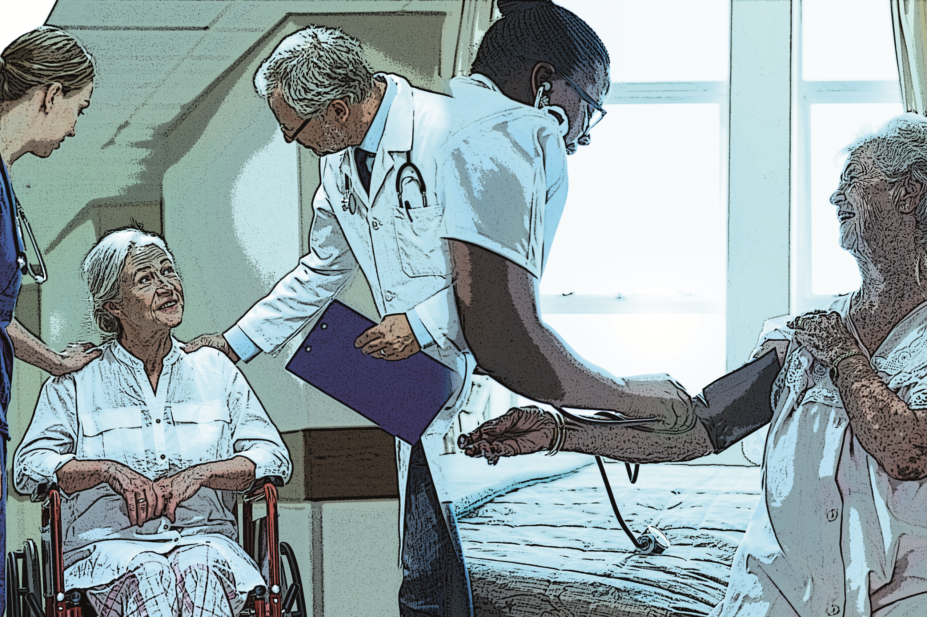
Shutterstock.com
On 6 January 2017, the Red Cross declared that the NHS was in a state of “humanitarian crisis” and called on the UK government to invest more in health and social care. There has been much political posturing on the back of this announcement but a close examination of the original statement shows that the Red Cross is raising concerns about delayed discharge and the lack of investment in social care.
For well over a decade politicians have been calling for the integration of health and social care funding. As a politician, I regularly dealt with constituents with loved ones who, by the standards of most people, needed constant nursing care. But by the standards that were in place at the time, which have not substantially changed, those people were deemed to have only ‘social care needs’. These were individuals who were doubly incontinent, bed-bound, did not know the day of the week and were often aggressive to their loved ones. They required 24-hour love and attention and yet this was only deemed a ‘social’ need.
The good news is that politicians of all political colours have now acknowledged the need to join up health and social care funding. The question is, why hasn’t this happened yet?
The answer requires a complex unpicking of the origins of both sources of funding. The NHS is now predominately free at the point of delivery and while the Poor Law — designed to reduce the cost of looking after the poor — was abolished, it is fair to say that its principles are still alive in the social care system. Only those with few personal resources are eligible for social care funding and this drives the NHS to move people towards social care. The system is ever more complicated because social care is funded by local government which, in relation to the NHS, has been deprived of cash.
The main loser is the patient who becomes a pawn in the political manoeuvrings between the NHS and local council. Ultimately though, we are all losers because this game playing — which has been going on for over 20 years — means poor use of the taxpayer’s pound.
An attempt to rectify the situation came in the form of the Better Care Fund, a collaborative programme spanning the NHS and local government that aims to put the most vulnerable people in society at the centre of their care. However, even if there are positive results, the NHS has a poor track record of spreading best practice. Unless there is clear direction from the government this issue will not be resolved. A bolder step would be the establishment of a fully integrated Department of Health and Social Care, with joint budgets and public accountability for the way the budgets are utilised.
There is also the question of how pharmacy fits into the picture. Most of the debate around multidisciplinary teams has been about how professionals work together across specific areas. Most hospitals have been working across sectors for some time but in community settings there is much to be done. I am confident that GP practice pharmacists will be the catalyst for greater joint working in primary care.
However, the reality is that we need to do more than this. Not only do we need to integrate further we also need to ensure that pharmacists work closely across the entire health and social care system.
In a joined-up system, community pharmacists would be the most direct link to the patient. They would oversee medicines supply and liaise with GP practice pharmacists for transfers of care. There is also huge potential for pharmacists to make domiciliary visits and liaise closely with social care. GP practice pharmacists would help link hospital and community pharmacists and help manage complex polypharmacy. There also needs to be stronger links between hospital specialist pharmacists and community pharmacists, so that specialist knowledge can be shared.
To achieve this we need pharmacists at all levels of the NHS. The Royal Pharmaceutical Society (RPS) missed a trick when, before my time, it did not push for pharmacists to be on the board of every clinical commissioning group.
Consequently, as the localism agenda bloomed, pharmacy withered on many local vines. It is incumbent on us all to influence locally to demonstrate what we can do and how pharmacy can benefit the NHS.
The Sustainability and Transformation Plans (STPs) are now where the action is but local pharmacists have, in many areas, been locked out of the picture. Local leaders must engage with STPs and encourage them to “think pharmacy”. This will complement the work of the RPS English Pharmacy Board — if we provide solutions, we can make a difference.

